Hugo Chávez 2
Argentina: Fidel’s Last Trip Abroad

Argentina: Fidel’s Last Trip Abroad
By Orestes Pérez Pérez
August 12, 2020
Translated and edited by Walter Lippmann for CubaNews.
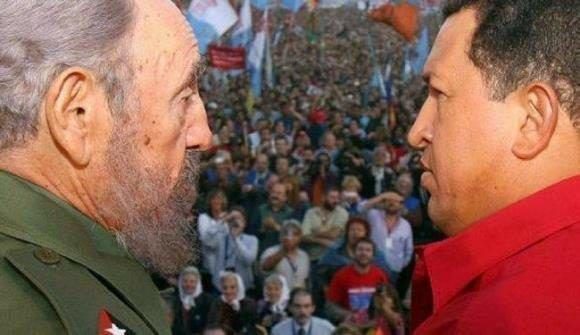
Fidel and Chavez in a massive act in Argentina. Photo|> Archive
On four occasions, Commander-in-Chief Fidel Castro Ruz was in Argentina. His last trip abroad was precisely to that country, on the occasion of a Summit of Mercosur Presidents, held in the city of Córdoba, in July 2006.
Wearing his inseparable olive green uniform and almost without warning, Fidel arrived at the Ingeniero “Ambrosio Taravella” International Airport in Córdoba at around 8:30 pm on Thursday, July 20, 2006, where he was received by then President Néstor Kirchner.
Some witnesses tell of that historic visit, that until the last moment there was no news of the Cuban president’s arrival, which took place amidst the strictest security measures.
“This must be the only meeting in which I was not made a plan of attack. I had to disinform even my friends. I don’t think anyone knew if I was coming, not even me”, he commented in a speech delivered at the so-called “Summit of the Peoples”, on a cold night, typical of these southern winter months, at the University of Cordoba, the same one that was the scene of the remarkable University Reform of 1918, more than 100 years ago.
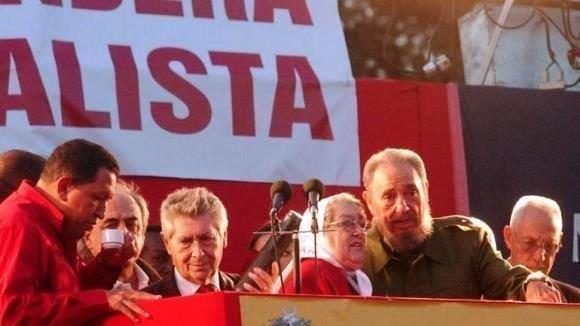
Fidel at the popular event in Cordoba with Hebe de Bonaffini. Photo> Archive
“You made a reform that made history, which was the most important, I am about to say the only one. But time has passed, and the world study system must be reformed,” said the Historical Leader of the Cuban Revolution, who was accompanied that night by Hugo Chávez and Hebe de Bonafini, head of the Mothers of Plaza de Mayo, the group that organized the event.
Thousands of people from Cordoba and other provinces of the country listened attentively to Fidel, who spoke with them for three hours about the most varied issues, including the urgent need for Latin American and Caribbean integration, social programs in Cuba, public education and the literacy campaign of the first years of the Revolution, among others.
Chavez, for his part, had promised to be brief. “I told Fidel, I’m just going to be his host,” he said to the crowd that applauded him and repeated his last name over and over again. Nevertheless, he reflected for several hours on the “Cordobazo”, the challenges of Mercosur and American imperialism. “Only the people make history,” he said that night in Cordoba.
The Commander-in-Chief had been in Argentina on three previous occasions: in 1959, invited by then-President Arturo Frondizi, at the Ibero-American Summit (1995) and in 2003, when he attended Kirchner’s inauguration, when he delivered his memorable speech on the steps of the Law School of the University of Buenos Aires (UBA), before around 30 thousand people.
In this last trip Fidel visited -together with Chávez- the house where Che lived in Alta Gracia, where they shared anecdotes of the Heroic Guerrilla’s childhood and got to know closely the spaces he lived in during his childhood.
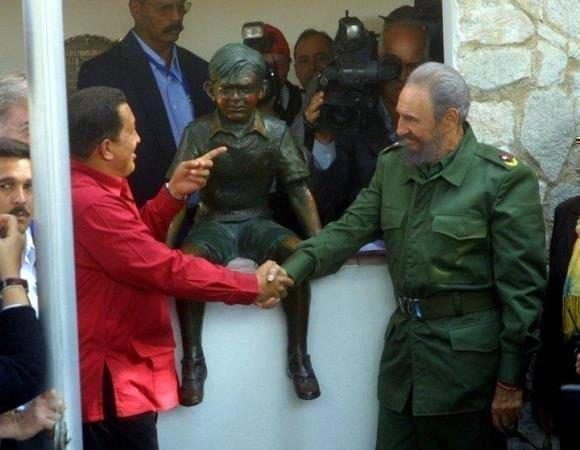
Fidel and Chavez at the Che house in Alta Gracia. Photo> Archive
The peaceful mountain village, which enjoyed a sunny and somewhat hot day, unusual for the season, saw its usual mid-afternoon rest interrupted by the unexpected visit.
Since very early in the morning, that July 22nd, the people from Alta Gracia took over the streets of this mountain village, with 45 thousand inhabitants, 35 kilometers away from the capital of Córdoba, to take pictures, hug or -simply- shake hands with these two world leaders.
A sea of people, all surprised and incredulous, shouted and applauded the presence of Fidel and Chávez. For them, it was the most transcendental event in the history of that small town. For Fidel, perhaps without knowing it, his last trip abroad.
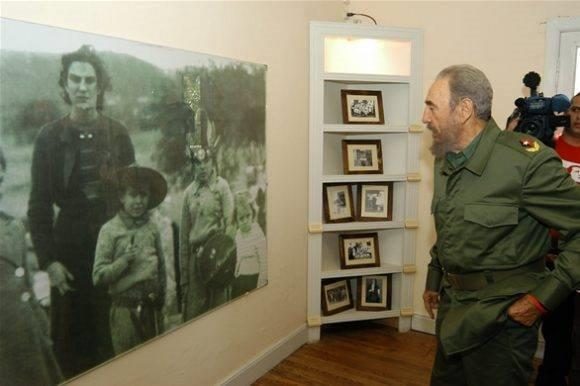
Fidel and Chavez at the Che house in Cordoba. Photo> Archive
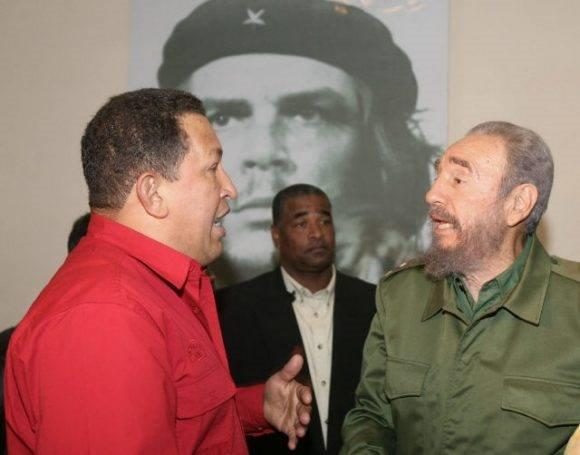
Fidel and Chavez at the Che house in Cordoba. Photo> Archive
The leader, history and infamy
- English
- Español

The leader, history and infamy
The propagandists of capitalism persist in the practice of discrediting leaders to prevent them from influencing the fate of society
Author: Luis Manuel Arce Isaac | internet@granma.cu
March 3, 2016.
A CubaNews translation.
Edited by Walter Lippmann.
Ruthless media attacks against leaders like Evo Morales, Hugo Chávez, Nicolás Maduro, Rafael Correa, Luiz Inácio Lula da Silva, Dilma Rousseff, Cristina Fernández and Néstor Kirchner, just to mention the more recent, are not unique and have been made since time immemorial.
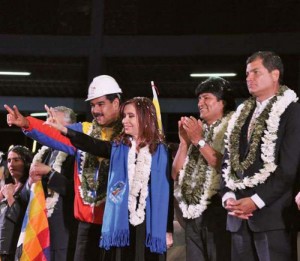
Discrediting practices still persist against popular Latin American leaders. Photo: TELESUR
A very emblematic case was the known Leipzig Process in 1933 against the Bulgarian labor leader Georgi Dimitrov, accused by German Fascists of the Reichstag fire. It was a farce orchestrated by Hitler’s Nazis in order to strike a mortal blow against the Communists and to justify everything we already know.
This subject –which is part of the philosophical debate of the role of the individual in history, developed by Russian George Plekhanov in 1898– comes to light considering the attacks of the retrograde right against leaders like Fidel Castro and Hugo Chávez aimed at burying their political thinking and now taking as subjects current leaders like Nicolás Maduro, Evo, Lula, Correa or Cristina.
Traditionally, ultraconservative analysts have distorted the fundamental role of the individual without which social processes run the risk of not reaching their destination due to lack of leadership, dispersion or anarchy.
The promoters of capitalism persist in the practice of discrediting leaders to prevent them from influencing the fate of society. They go to extremes such as the physical elimination by any means, if they fail in their smear campaigns of disqualification.
Plekhanov said that a great man is not great because his individual peculiarities imprint a personal outlook on great historical events, but rather because he is equipped with special features that make him the most capable individual for serving the great social needs of his period.
In that statement lies a response to what we are currently seen in Bolivia, Venezuela, Ecuador, Brazil and even in Argentina where, with Nestor Kirchner deceased and Cristina no longer in the presidency, Mauricio Macri’s and his henchmen’s attacks against them are equally or more intense than when they were in power.
The assassination of Ché (Ernesto Guevara) by order of the establishment, and the hundreds of attempts against the life of Fidel Castro, are contemporary extremes in our Latin America of that infamous policy. There are other examples: Jorge Eliecer Gaitán Francisco Caamaño, Maurice Bishop, Augusto César Sandino, Jacobo Árbenz and many others, whose existence the imperial system could not tolerate.
The media campaign against Maduro is so huge and infamous as that executed against Chávez or what they are doing now against Evo.
The thing is that Bolivia and Venezuela are battlefields of a war of positions not unrelated to what happens in the Middle East, because there is a global class struggle that must lead to a new global correlation of forces; this is no secret.
The Bolivian Minister of the Presidency, Juan Ramón Quintana, was clear in denouncing the US for applying a covert political operation of great dimension aimed at weakening the people’s trust in Evo’s government. US interests in a change in the correlation of forces is very strong because of their wish to control Bolivia’s vast natural resources.
More accurate still: Quintana said that in this context of global power struggle, Bolivia is important because of the role of President Evo Morales and his international leadership at a time when a new global order is being shaped; and that explains the dirty war to try to discredit him.
In Venezuela, in these early days of March, people will begin paying tribute to President Chávez, on the third anniversary of his death on March 5th. This will be an occasion for heads of state and government and social activists to gather in Caracas and reflect on these facts.
Frei Betto said recently in one of his articles that “in capitalism any axiological system (values and judgment) constitutes a nuisance.” Logically, popular leaders are the chief bother for conservatives. (PL)

El líder, la historia y la infamia
Los propagandistas del capitalismo persisten en la práctica de la desacreditación del líder para impedir que este pueda influir en los destinos de la sociedad
Author: Luis Manuel Arce Isaac| internet@granma.cu
3 de marzo de 2016 21:03:20

Aún persisten prácticas de desacreditación contra los líderes populares latinoamericanos. Foto: TELESUR
Despiadados ataques mediáticos a líderes como Evo Morales, Hugo Chávez, Nicolás Maduro, Rafael Correa, Luiz Inácio Lula da Silva, Dilma Rousseff, Néstor Kirchner o Cristina Fernández, por citar los más cercanos, no son únicos, y se realizan desde tiempos inmemoriales.
Un caso muy emblemático fue el conocido Proceso de Leipzig en 1933 contra el líder obrero búlgaro Jorge Dimitrov, acusado por los fascistas alemanes del incendio del Reichstag, farsa hitleriana montada por los nazis con el propósito de asestar a los comunistas un golpe mortal y justificar todo lo que ya conocemos.
Este tema, que se inscribe dentro del debate filosófico del papel del individuo en la historia, desarrollado por el ruso George Pléjanov en 1898, surge a la luz ante los ataques de la derecha retrógrada a líderes como Fidel Castro y Hugo Chávez con el fin de sepultar su pensamiento político, pero tomando de sujeto a dirigentes actuales como Nicolás Maduro, Evo, Lula, Correa o Cristina.
Tradicionalmente los ultraconservadores han tergiversado ese papel fundamental del individuo sin el cual los procesos sociales correrían el riesgo de no llegar a su destino por acefalia, o dispersión y anarquía en su conducción.
Los propagandistas del capitalismo persisten en la práctica de la desacreditación del líder para impedir que este pueda influir en los destinos de la sociedad, y llegan al extremo de la eliminación física por cualquier vía, si fracasan sus campañas de desprestigio y descalificación.
Pléjanov decía que un gran hombre lo es no porque sus particularidades individuales impriman una fisonomía individual a los grandes acontecimientos históricos, sino porque está dotado de particularidades que le convierten en el individuo más capaz de servir a las grandes necesidades sociales de su época.
En esa observación radica una respuesta de lo que vemos en estos momentos en Bolivia, Venezuela, Ecuador, Brasil e incluso Argentina donde, aun con Néstor Kirchner fallecido y Cristina expresidenta, los ataques de Mauricio Macri y sus acólitos son tanto o más intensos que cuando estaban en el poder.
El asesinato del Che (Ernesto Guevara) por orden del establishment, y los cientos de atentados contra Fidel Castro, son extremos contemporáneos en nuestra América de esa infame política, sin ir más atrás desde Jorge Eliécer Gaitán a Francisco Caamaño y Maurice Bishop pasando por Augusto César Sandino, Jacobo Árbenz y otros muchos, cuya existencia el sistema imperial no podía soportar.
La campaña mediática contra Maduro es tan descomunal e infame como la que ejecutaron contra Chávez o lo que hacen ahora con Evo.
Es que Bolivia y Venezuela son campos de batalla de una guerra de posiciones en nada desvinculada de lo que ocurre en el Oriente Medio porque se trata de una lucha de clases global que debe desembocar en una nueva correlación mundial de fuerzas, lo cual no es un secreto para nadie. El ministro boliviano de la Presidencia, Juan Ramón Quintana, fue claro al denunciar que Estados Unidos aplica una operación política encubierta de grandes dimensiones para intentar debilitar la confianza del pueblo en su gobierno, pues en un cambio en la correlación de fuerzas es muy marcado el interés estadounidense por dominar los grandes recursos naturales de Bolivia.
Más preciso todavía, Quintana dijo que en este contexto de disputa global por el poder, Bolivia es importante por el papel del presidente Evo Morales y su liderazgo internacional en momentos que se configura un nuevo orden global, y eso explica la guerra sucia para intentar desprestigiarlo.
En estos primeros días de marzo comienzan en Venezuela los homenajes al presidente Chávez, cuyo tercer año de fallecido se cumple mañana día 5, buen momento para que los jefes de Estado y Gobierno y activistas sociales que se darán cita en Caracas, reflexionen sobre estos hechos.
Frei Betto decía recientemente en un artículo que en “el capitalismo cualquier sistema axiológico (valores y juicio) constituye un estorbo”. Por lógica, los líderes populares son la principal molestia de los conservadores. (PL)
Subscribe to Blog via Email
| M | T | W | T | F | S | S |
|---|---|---|---|---|---|---|
| 1 | 2 | 3 | 4 | 5 | 6 | 7 |
| 8 | 9 | 10 | 11 | 12 | 13 | 14 |
| 15 | 16 | 17 | 18 | 19 | 20 | 21 |
| 22 | 23 | 24 | 25 | 26 | 27 | 28 |
| 29 | 30 | |||||

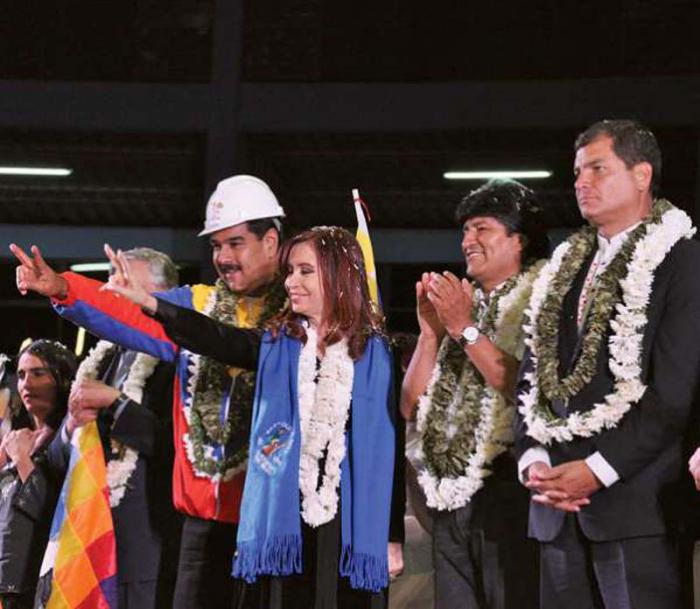
You must be logged in to post a comment.